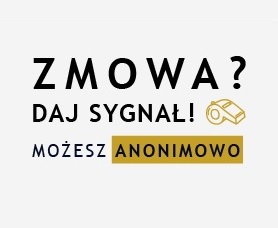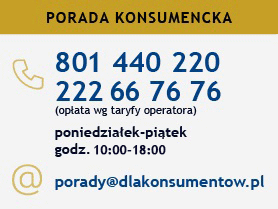Tu jesteś: Strona główna > Urząd > Informacje ogólne > Aktualności
Consumer, do not let yourself be deceived by alternative investments ads
< poprzedni | następny > 04.12.2020

- Celebrities encouraging you to invest on the Forex market or in cryptocurrencies? Be careful as it may be a scam to extort your money and data.
- President of UOKiK gives another warning: watch out for offers promising fast, easy, and high profits without leaving your home and allegedly without incurring any risks.
- Instead of earning money, you can lose it or even fall into debt.
The Authority and other institutions have been receiving complaints from consumers who have fallen prey to ads illegally using the image of celebrities – sportspeople, media figures, and businesspeople – to encourage them to invest in high risk projects. This may be for instance a fake interview with a famous footballer or a TV celebrity talking about their investment successes, which was published on the Internet. Trusting such a well-known and popular person, consumers start to show interest in an offer, provide their contact details, and subsequently they are contacted by persons calling on behalf of so-called “investment platform” who will do anything to talk them into opening an account and transferring money to it. There have even been situations when fraudsters were able to obtain consumers’ data in order to take out high loans using their names.
We consistently warn people against alternative investment, which promise larger-than-average profits in a short term and allegedly without any risk. Consumers should see a red flag when they hear slogans such as “earn money without leaving your home” or “Ms. X used to be a cleaning lady, now she earns millions”. Senior citizens as well as young people, who despite being Internet-savvy, have no experience in investing, are particularly susceptible to such ads. Since July, we have been implementing the campaign entitled “Check, Read, Ask!”, where we advise people on how to protect yourself against frauds and losing money, says Tomasz Chróstny, President of the Office of Competition and Consumer Protection.
“Investments” in gold, diamonds, land, waste, cryptocurrencies, provision of advertisements, collector’s items, investment packages, or Forex market instruments may turn out be risky. In many cases, profits are to depend on recruiting other people into the system, which turns out to be a pyramid-like incentive scheme, which constitutes an unfair market practice and is prohibited. Sometimes a consumer also falls prey to a fraud in the form of so-called pyramid scheme. Chances of earning money in such undertaking are slim. At the beginning, the consumer obtains small amounts as encouragement and contributes disproportionately larger amounts to the system at the same time, whereas, as a rule, in the end they lose all the money they have paid. To make it worse, such investment platforms are usually registered outside the EU, which is why consumers must be aware of the risk related thereto, including the risk that pursuing claims is really difficult and expensive or even impossible.
Consumer, watch out for:
- Pyramid-like incentive schemes. These are systems in which the consumer is solicited to participate in the "project" in the sales system in exchange for the promise of remuneration or other material benefits, which depend primarily on the recruitment of more people into the system and not on the sales or consumption of goods. Such schemes typically involve investments in tokens, cryptocurrencies, educational or language packages, apartments, etc. The scheme operates in the following manner: you pay in money and recommend others, for which you receive remuneration if they join in. The remuneration comes mostly from the payments made by the persons recommended by you, not from investments or sales. However, after a certain period of time, the system must collapse since the money that you pay is not invested and does not yield any profits, instead it is transferred to the organizers of the system and persons with a higher position in the chain. The system operates as long as the number of people participating in the project grows exponentially, and this is impossible in the long run. When it collapses, your money vanishes. Pyramid-type incentive schemes are hidden under the slogans “program”, “investments”, “making money on the Internet”, “work from home”, “advertising platform”.
- Forex market financial instruments. As a rule, they are addresses to very experiences investors, who accept high risk of making losses. Forex platforms lure people with an opportunity of gaining money quickly and easily. In many cases, they advertise their activities as a type of “success academy”. They present the pictures and stories of people who have allegedly made substantial profits using the methods presented on the sites in question. The enthusiastic comments of the alleged users of the portals as well as the slogans promising “quick and easy profits with minimum effort, without even having to leave the comfort of your home” are also designed to lure potential customers and encourage them to put their money forward. In reality, in most cases, the investment model is that a consumer bets against the creator of the investment platform, who simultaneously determines the rules and of FX transactions. Consumer’s profit equals loss of the Forex platform and vice versa – consumer’s loss equals profit of the platform. The truth is, however, that using products of this kind is not investment at all and is more akin to “placing bets” on changing values of currencies or stocks over a specific – mostly very short – timespan. PFSA data for 2014-2018 shows that approx. 80 percent of the Forex market customers make losses which are a dozen or so thousand Polish zloty annually on average.
- Cryptocurrencies. Many business models are being created which are based on an ever greater popularity of cryptocurrencies. They are used to create frauds, so-called pyramid schemes, and other unfair systems. They attract people without appropriate knowledge and experience in investing, who may fall prey to swindlers using their naiveness and belief in a quick profit. The value of cryptocurriences is not reflected in real economic indicators. When investing in systems based on cryptocurrencies, one needs to be aware of a possibility of losing money as a result of a virtual theft as well as other risks related to large speculative price changes, lack of general acceptance and use in criminal activities, i.a. in money laundering.
- Chain letters and fake news on the Internet. You should also be careful when it comes to chain letters, fake news, suspicious e-mails, and other spam messages which circulate on the Internet, even if they allegedly come from trusted persons or institutions. In some countries, swindlers use so-called “cryptocurrency wallets” in such offers, which may make us lose control over our savings. It is best not to click any links, not to open any attachments, we should not log in to unknown websites, nor should we make any payments since it may be an attempt to extort our money or data. Things such as spelling mistakes on a website or in an e-mail may indicate that we are dealing with fraud.
Hints and tips for consumers
- Never believe in fast, secure and high profit with no risk!
- The higher the profit they promise, the higher the risk!
- Check offers very carefully, particularly watch out for any kinds of “novelties”, particularly those from unknown individuals or organizations.
- Do not trust unknown persons who publish clips from their trips on the Internet, show their marvelous houses, boast about their lavish life, publish printouts from their bank accounts showing how much money they have earned in a simple and risk-free manner. These may be so-called “barkers” whose “profession” is to gain profits from various types of projects, whereas what they publish on the Internet is to talk you into investing.
- Do not trust the ads that pop up when you use social media – sometimes they involve paid services and inviting your friends to business projects that are in fact so-called financial pyramids.
- A reliable retailer provides their company details on the website – if they are not there, do not trust them.
- Pay attention to the company’s registered office. If it is registered outside the EU, it will be difficult to pursue claims against it.
- Check whether a given entrepreneur is not listed on the PFSA’s list of public warnings: https://www.knf.gov.pl/dla_konsumenta/ostrzezenia_publiczne.
- Read the documents you sign. They should be drawn up in Polish. Pay attention to linguistic errors. If you do not understand them, do not conclude a contract.
- Do not yield to pressure to make immediate transfers, especially to unknown accounts. Swindlers often exercise pressure telling you that the offer is limited in time.
- Give yourself time to make a decision – if somebody tells you to make it immediately as the opportunity will not happen again, they probably want to cheat you.
- Do not share your personal data and data allowing you to log in to your bank to strangers.
- Do not install software and do not download applications from unknown sources – this way someone may be trying to take control of your computer or smartphone.
- Ask your friends or loved ones for their opinion or advice.
- If you suspect fraud, report it to the police.
Consumer support:
Phone: 801 440 220 or +48 22 290 89 16 – consumer helpline
Email: porady@dlakonsumentow.pl
Consumer ombudsmen – in your town or district
Additional information for the media:
UOKiK Press Office
Pl. Powstańców Warszawy 1, 00-950 Warszawa, Poland
Phone +48 695 902 088, +48 22 55 60 246
E-mail: biuroprasowe@uokik.gov.pl
Twitter: @UOKiKgovPL
Pliki do pobrania
- Press release (88,04 KB, docx, 2020.12.04)
Warto przeczytać
Po interwencji Prezesa UOKiK, PZPN i Ekstraklasa SA zmieniły swoje praktyki, które mogły stanowić nadużywanie pozycji dominującej. ...>
Prezes UOKiK Tomasz Chróstny wydał dwie decyzje w sprawie AUTOCENTRUM AAA AUTO – łączna kara to ponad 72 mln zł. ...>
Po interwencji UOKiK poprawi się sytuacja producentów trzody chlewnej w systemie tuczu kontraktowego. ...>
Prezes UOKiK Tomasz Chróstny nałożył kary w łącznej kwocie prawie 8 mln zł na spółki Volkswagen Poznań i Solaris Bus & Coach za tworzenie zatorów płatniczych. ...>
Prezes UOKiK nałożył ponad 46 mln zł kary na CANAL+ Polska oraz nakazał zwrot środków konsumentom. ...>
Prezentowane na stronie wakacje.pl ceny wielu wycieczek były nieaktualne lub niepełne – inna cena pokazywała się w wyszukiwarce, a inna po rozwinięciu szczegółów oferty. ...>
Wyszukiwarka
Konsumencie, masz problem?
-
Kontakt
Urząd Ochrony Konkurencji i Konsumentów
pl. Powstańców Warszawy 1
00-950 Warszawa
tel. 22 55 60 800
uokik@uokik.gov.pl
Elektroniczna skrzynka podawcza ePUAP -
Porady dla konsumentów
- Infolinia Konsumencka, tel. 801 440 220 oraz 222 66 76 76 czynna od poniedziałku do piątku w godz. 10:00 - 18:00, opłata wg taryfy operatora.
- porady@dlakonsumentow.pl
- Rzecznicy konsumentów
- Europejskie Centrum Konsumenckie





















